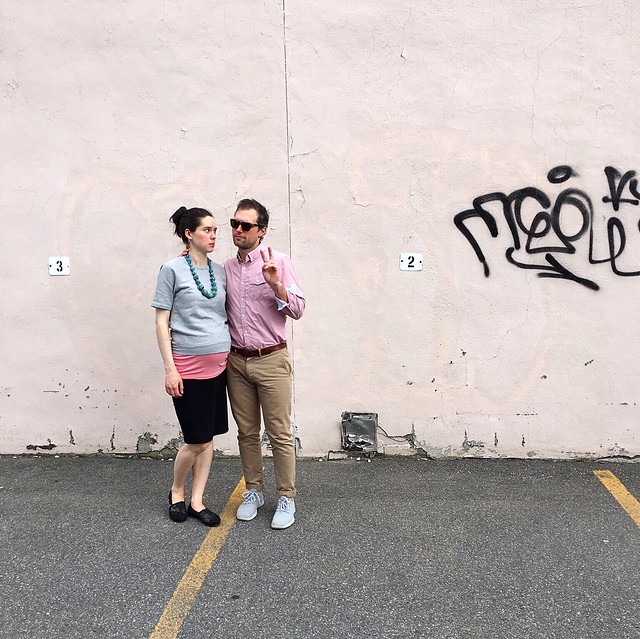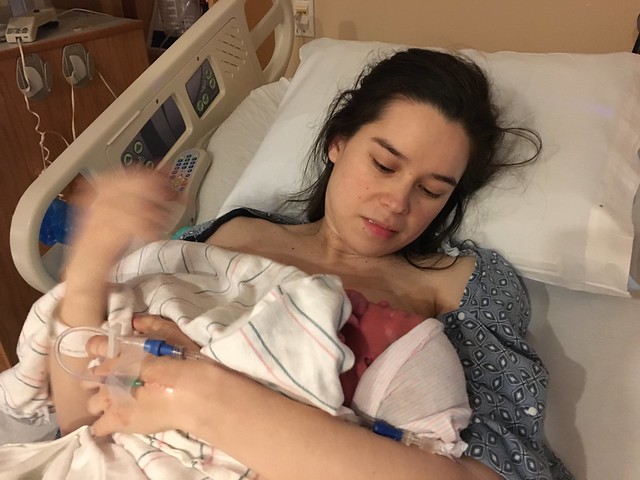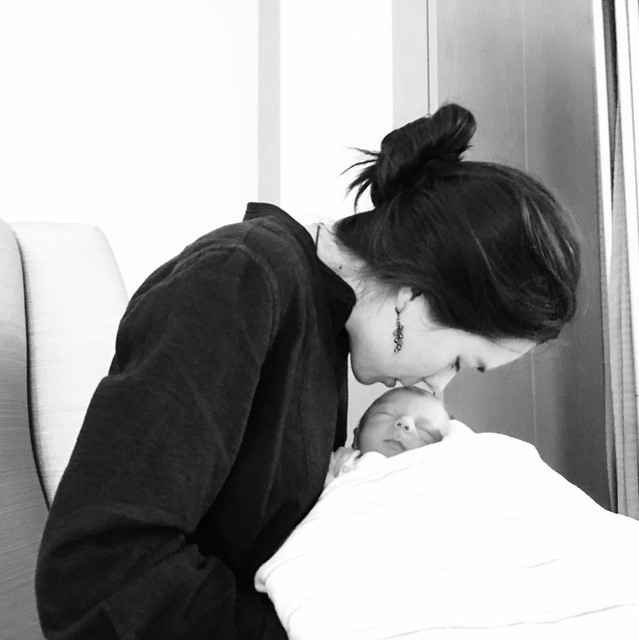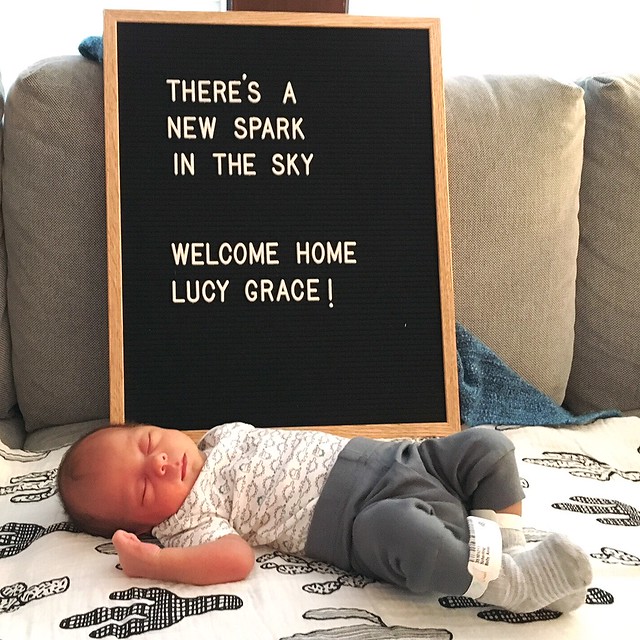I went into labor a year ago today, which feels like an appropriate time to finally share Lucy's birth story. It was a bumpy entry into parenthood, but it reminds me I am stronger than I think, Ian is my rock, Lucy is incredible, and God is in control.
My pregnancy started out textbook. The biggest hiccup was needing a second take on our 18-week ultrasound (which resulted in our first parenting lessons: dealing with fear and accepting our lack of control; we also remembered why it's never a good idea to Google anything medical—our doctor suggested sticking with the Mayo Clinic).
Things continued along swimmingly until April 7, when I went in for a growth check ultrasound. I was measuring a little small at my previous appointment and the doctor wanted to confirm the baby was still on track. The baby's size was fine, but the ultrasound revealed an umbilical cord cyst. The ultrasound doctor assured me it wasn't a problem, but we should monitor it to make sure it didn't become one. I drove to my prenatal appointment with the news, but my doctor immediately sent me to the Brigham for high blood pressure. This was the first appointment where I was flying solo and, already stressed, I had to drive down Route 9 to Fenway. I called Ian to meet me at the hospital, and spent the afternoon hooked up to monitors. The baby's heart rate was strong, and my blood pressure was back in the high range of normal, so they sent us home with a directive to take things easy—a challenge given our not-quite-completed bathroom project.

Because it looked like I was moving towards preeclampsia, my doctor bumped me up to two appointments a week, alternating non-stress tests and ultrasounds to keep an extra eye on the baby, and instructed me to take my blood pressure at home twice a day. By April 18, my doctor put me on modified bedrest, and we began talking about an induction, trying to manage the increasing health risks while allowing the baby as much time as possible to grow. It was hard to wrap my mind around the concerns, which were marked only by unfamiliar numbers. I felt fine.
I spent the week on the sofa, binge-watching shows to distract myself from the list of things I had hoped to finish before baby, with Ian shuttling me to and from doctors appointments. On Monday, I was measuring 3 centimeters, which thrilled my doctor because it increased my chances for a successful induction. The office scheduled us for Friday morning, putting delivery at almost 38 weeks, which we hoped was the perfect balance between safety and growth. Tuesday afternoon, I got a call from my doctor, checking in. (I found out later she was worried about me: I love having a doctor who cares!) I ran through the preeclampsia checklist: no headache, no changes in vision, no upper abdominal pain. And no contractions. At all. So we kept planning for Friday.
That evening after dinner, Ian and I watched The Fish on My Plate (because we're PBS junkies). I had a hard time getting comfortable, but it felt more like indigestion than anything. We got ready for bed around 11 p.m., and I started feeling more uncomfortable. I asked Ian to download a contraction app, just in case, but I thought if anything, it was my first practice contractions. We rummaged around for the handout from our birthing class that described the difference between real and false labor, and I hunkered down in the nursery chair. Contractions seems to be getting closer together yet more unpredictable. Around 1 a.m., I threw up (christening our beautiful new bathroom). Ian said, "we're going to the hospital," and immediately loaded our bags in the car. Ian, who almost never makes a wrong turn, had a tough time navigating in Fenway and was driving fast to make up the difference. I felt every pothole and insisted he slow down, joking, between contractions, that if he didn't the baby would just fall out in the car.
We pulled up to the entrance, and I felt like I was in a movie. SCENE: Nighttime in the city, and the hospital entrance lights shine bright on a small blue car. A pregnant woman exits in her robe and slippers, hair disheveled, and doubles over, gasping. A flustered man juggles a suitcase and duffel bag while handing car keys to a valet, then helps the pregnant woman through the large revolving doors.
We entered maternity admitting, where a kind woman walked me through electronically signing all the paperwork before escorting us to the elevator. I was having trouble keeping up, and she reassured me we could pause during contractions. After getting settled in a triage room, a nurse hooked me up to the machine and ran through a list of questions. The doctor came in and, with surprise and excitement, said I was at 7 centimeters, and I'd be having a baby that morning.
I was exhausted, and decided to go ahead with an epidural, but my window was small. They settled us into a room on the labor and delivery floor, and sent in the anesthesiologist resident. He casually asked a few questions and ascertained that "we probably still have time." Ian, who was facing me, and therefore the resident, worried at his fumbling, but I was too focused on surviving contractions to notice. Thankfully, there were no issues, and Ian and I both tried to get a little rest.
Around 6 a.m., the doctor said it was time to push. She and our nurse were amazing coaches, and after 15 minutes and 3 sets of pushes, they announced we had a daughter! I lost all sense of time and my memories are hazy, but I distinctly remember the nurses putting her on my chest. The doctor asked what we were going to name her. Ian and I locked eyes and said Lucy. I felt, simultaneously, like I had known her forever and distant as if I was watching everything happen to someone else. She was so tiny and snuggly and beautiful, strange and familiar.

Ian, Lucy, and I rested and bonded as we waited for our postpartum room to be available. A nurse came to transfer us. She got me up and helped me to the bathroom, where I promptly almost passed out. The nurse told Ian to press the panic button for more assistance to get me back in my bed, and they had me rest more before another attempt at moving.
In the early afternoon, we made it to our postpartum room. The nurses took my and Lucy's vitals as we got settled. Mary, Lucy's nurse, noticed her temperature was a little low. They whisked her to the nursery to warm her up, reassuring us we'd have her back in no time. But we soon learned she had low blood sugar and needed to spend the night in the NICU. This kicked off a rough couple days for all of us. Lucy's blood sugar tanked overnight and so her NICU stay automatically extended to a five-day minimum. Her bilirubin levels were high so she needed phototherapy. I passed a few large clots and between the blood loss, new blood pressure meds, and exhaustion, my NP confined me to bed for a day. Ian went back and forth between my room and Lucy's in the NICU, trying to take care of both of us at once.

As soon as I was mobile again, Ian wheeled me down to the sixth floor to spend time with Lucy. It broke our hearts to see her in an incubator with wires everywhere and an IV in her arm, and we spent every moment we could in her room, holding her for as long as she could be out of the incubator.
On Saturday, I was discharged. They wheeled me out, arms empty, and we drove home, feeling like we had abandoned our daughter.
We unpacked our hospital bags, grabbed a few picture books to read to Lucy, and headed back to the Brigham. We settled into our new routine. Wake up. Go to the hospital. Find out Lucy's overnight glucose numbers. Every three hours, change her diaper, check her temperature, watch the nurse prick her heel for a glucose check, give her a bottle, tube feed what she can't finish. Pump. Doze. Ignore the constant monitor beeps going off all over the NICU. Sneak in lunch and dinner. Go home. Sleep. Pump. Sleep. Pump. Start again.

We didn't allow ourselves to think past the next feeding. Every step forward came with another setback. Lucy's care team ran tests to rule out any issues, and determined she just needed more time to grow and develop: she was an unofficial late-term preemie.
My mom arrived. We thought we'd be at home, happy, exhausted, and ready for an extra pair of hands. Instead, she joined our commute, sitting with us in Lucy's room, cooking and cleaning during our few hours at home. Meanwhile, I focused all my energy on pumping, which felt like the only thing I could still do to take care of Lucy.

After almost two weeks, Lucy weaned off her IV and moved to an open crib. One of our primary nurses posted her going-home checklist on the wall. We joked that we should hide it from Lucy so she wouldn't attempt to extend her stay. Six days later, on Mother's Day, she graduated from her feeding tube. Three days later (two days after her due date), she passed her six-hour fast test, proving she could maintain her glucose levels, and we were suddenly packing up her room, going over discharge papers, and getting wheeled out of the hospital, this time with a baby in my arms.
Bringing Lucy home was so much sweeter after everything we had been through. Those three weeks in the NICU felt like an eternity, but NICU staff kept telling us it would feel like a blip once we were home. They were right. And while I wouldn't wish a NICU experience on anyone, we learned so much about being parents, handling stress, and facing the unknown. The first few months were so hard, exhausting, overwhelming, but we had a sense of calm and confidence that I don't think we would have otherwise. For that, I am thankful. And we would do it all a hundred times over. Lucy, you're worth it. We love you more than you could ever know.
+
We are so grateful for all of our family and friends who supported us with overwhelming love and encouragement. A special thanks to my parents who didn't bat an eye about spending their entire visit in the NICU, to Ian's parents who helped us figure out how to transition out of hospital mode, to Amanda for keeping me company when I couldn't visit Lucy, and to all our friends who kept us going with hospital visits, meals, froyo, medical advice, welcome-home art, Mother's Day gifts, and shoulders to cry on. We love you, Wen, Wilbur, Jose, Enid, John, Erin, Grey, Harper, Reed, Brett, Emily, Grady, Pepper, Ryan, Kelly, Rowan, Heather, Haven, Bomin, Beth, Nate, Danielle, Mike, Karen, Aiden, Miles, Owen, Micah, Marianna, Annie, and Elliot.
We are also so thankful for Lucy's incredible care team at the Brigham, especially her nurses Mary (who first noticed Lucy needed extra care), Kerri, Brendan, Maureen, Janine, Yelena, Mary Ann, Stephanie, Kathy, Nancy, Corinne, Kirby, Lauren, Rachel, Donna, Julie, Lilian, Danielle, Mary, Christine, Sheila, Kathy, Barbara, Ashley, and Brittany; her neonatology fellows Jonathan and Bridget; her PA Nancy; Dr. Streimish, Dr. Gorman, Dr. Kaza, and Dr. Prendergast; her feeding therapist Katherine; her physical therapist Nicole; Christine, Corinne, and Mary Ann from the lactation team; and Erin and Gayle from family support. (If you'd like to join us in paying it forward, consider supporting the Friends of the NICU.) It takes a village, and we feel so fortunate that the Brigham was ours. (Also, thanks to Dr. Lieberman, Dr. Vincent, and Nancy for taking care of me when my own recovery was the last thing on my mind.)
A three-week stay in the NICU is well into the six figures. We are so thankful we have insurance that meant we didn't have to worry about how to pay for Lucy's medical care. Having a baby in the NICU is stress enough. Jimmy Kimmel shared about his newborn son's open-heart surgery while Lucy was in the NICU. I don't know the answers to our healthcare system, but as Jimmy said, “No parent should have to decide if they can afford to save their child’s life.” I hope and pray that as a country we can put aside our differences to take care of our most vulnerable.

